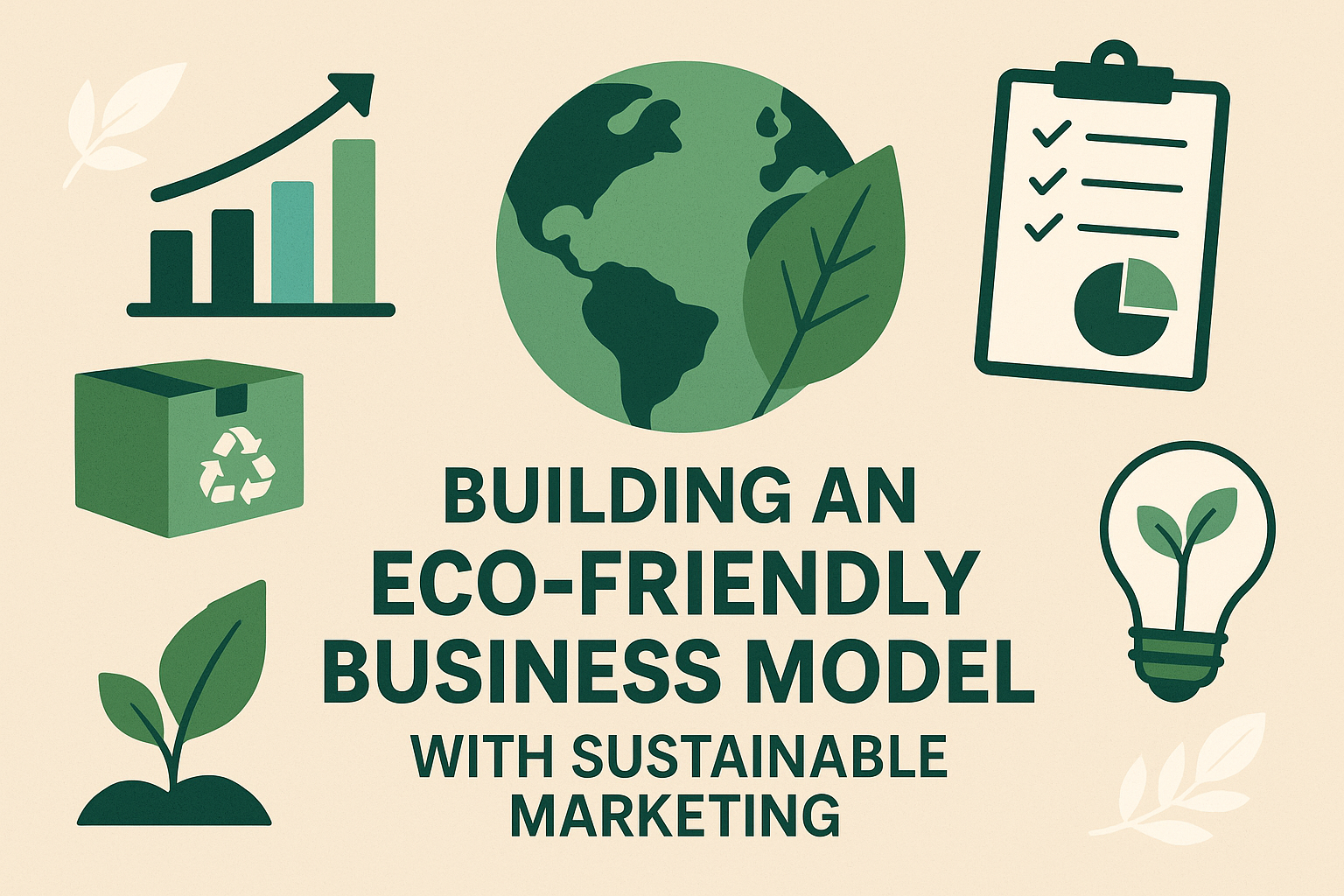Designing an eco-friendly business model isn’t about slapping a green label on your homepage and calling it a day. It’s about treating sustainability like a system—something that touches your supply chain, your product choices, your communications, and your bottom line. Marketing, when aligned with that system, becomes less about shouting and more about showing. If you're serious about operating ethically in a warming world, here’s how to ground your values in action.

Image via Pexels
Audit What Counts
Before you make sustainability promises, take a brutally honest look at what your business is actually doing. That means mapping your supply chains, utility bills, delivery practices, office operations—everything. Many companies go straight to buying carbon offsets or printing reusable totes before they've even looked at their own data. Don’t. Instead, start by assessing your environmental footprint across operations to identify the most impactful places to intervene. A thoughtful audit helps you spot waste you didn’t know existed—like vendor inefficiencies or packaging overkill—so you can address the root, not just the symptoms. Build your operations around this clarity, not assumptions. It’s the only way to make smart changes that stick.
Form Your Business the Smarter Way
Even in the formation stage, you have choices that carry weight. Filing by mail, printing dozens of copies, and driving across town to submit paperwork might feel normal—but it adds friction and emissions before your company even starts. Fortunately, there’s now a way to start learning. Many founders are using online-first services like ZenBusiness to simplify business formation while reducing reliance on paper-based processes. For entrepreneurs building with environmental intent, choosing tools that digitize bureaucracy is just another way to align values with action. Little efficiencies compound when you start from the ground up. This isn't just about convenience—it's infrastructure that reinforces your mission.
Let Customers’ Needs Lead
You don’t earn loyalty by preaching. You earn it by solving real problems, better. Many sustainable ventures lose traction because they focus too much on being green and not enough on being useful. Here’s the truth: customers want value. And if your product doesn't work as well as the conventional version, the fact that it’s compostable won't save it. To build a viable model, you must balance functionality with green value—delivering efficiency, ease, or comfort in ways that also align with environmental goals. People don't want to feel guilty into buying. They want to feel smart for doing so. Every eco-conscious innovation should make someone’s day easier, not harder.
Rethink Creative Production
Marketing has its own environmental footprint, and most teams don’t think twice about it. Printing prototypes, ordering test swag, shipping promo kits across the country—these things add up fast. But there are better ways. With the right tools, you can visualize campaign concepts, iterate logos, or mock up event visuals entirely online. New AI-powered creative engines let brands reduce their physical waste while increasing speed, accessibility, and design variation. If you’re trying to run lean, ethically, and with fewer carbon-heavy steps, explore further into digital-first production workflows. The planet doesn’t need more printed mailers. It needs more smart previews. And your team doesn’t need another late shipment—they need iteration at the speed of relevance.
Built-in Impact Layers
Too many businesses bolt sustainability onto the end of their process—offsetting emissions here, donating 1% there—without ever questioning the model itself. That’s the wrong direction. Eco-conscious design starts upstream. It begins with sourcing, continues through manufacturing, and extends into customer use and end-of-life disposal. Companies that lead in this space integrate lifecycle thinking directly into their operations, meaning they build from impact, not just for optics. That might look like using post-consumer waste as raw material, designing for modular repairs, or establishing take-back programs before your product even ships. When done well, this approach doesn’t just reduce harm—it unlocks differentiation. Suppliers will take your calls. Investors notice systemic thinking. And customers become advocates when they see their choices contributing to something regenerative, not just less damaging.
Storytelling That Moves People
People don’t remember claims. They remember characters. Real stories from real users—about real change—go further than stats and slogans ever could. When you communicate your business’s values, drop the buzzwords and show the outcomes. A compostable phone case is fine. A video of a dad fixing his kid’s broken toy using your remanufactured part is better. ClimateSort says more and more marketing teams are waking up to the power of emotion-first communication, using testimonials, short films, and personal anecdotes to use human-scale sustainable stories that people can feel. Show us the before-and-after. Let people see a mess turned meaningful. The more grounded the narrative, the more durable the trust. Don’t aim for mass appeal—aim for specificity that travels. Trust follows emotional clarity, not technical precision.
Avoid Greenwashing Pitfalls
If your marketing sounds greener than your operations, you’re already in trouble. Today’s consumers are savvier than ever, and one misleading claim can spiral fast. But you don’t need to oversell if you’re building the right foundation. Keep your claims specific. Focus your language on what you’ve done, not what you hope to do. Transparency wins. That’s why some businesses now run public sustainability dashboards or embed third-party audits into product pages—real proof, not polish. One of the most important safeguards against greenwashing is to ground claims in proven actions that audiences can independently verify. You’re not telling a story. You’re proving one. Better to say less, honestly, than promise more and lose credibility forever.
Sustainable business isn't just a trend. It’s a cultural shift—and it’s demanding more than lip service. Whether you’re a solo founder or managing a growing team, integrating eco-conscious practices into your business model and marketing plan requires action that echoes across everything you do. Start with honesty. Design for impact. Communicate with the soul. And don’t forget: sustainability is a lens, not a label. This isn’t about being perfect. It’s about being precise, responsive, and real. Sustainability, like trust, is cumulative. Every decision you make tells a story. Make sure yours is one people want to repeat, not just skim.
Unlock the potential of your business with actionable insights and expert strategies from Blox Business, your go-to resource for thriving in today’s competitive markets.
Comprehensive CPG marketing strategies designed to strengthen brand presence, optimize retail distribution, and drive consumer engagement.
DTC marketing solutions tailored for brands selling directly to consumers. Strategies focus on customer acquisition, retention, and digital optimization for long-term growth in competitive markets.
Boost your brand’s authority with Blox Marketing’s Blog Posts & Guest Blogging Services. Get engaging, SEO-optimized content that drives traffic and builds credibility.
Unlock the right keywords for your business with Blox Marketing’s Keyword Research Services. Improve SEO rankings, optimize content, and drive targeted traffic.
Get Started with Blox Marketing Today
Ready to take your marketing to the next level? Contact Blox Marketing today to learn more about how our full suite of services can help your business grow. Whether you need SEO, PPC, or social media marketing, we have the expertise and experience to deliver impactful results. Let’s collaborate on building a strategy that will take your brand to new heights.




.png)
.png)




.png)
.png)
.png)
